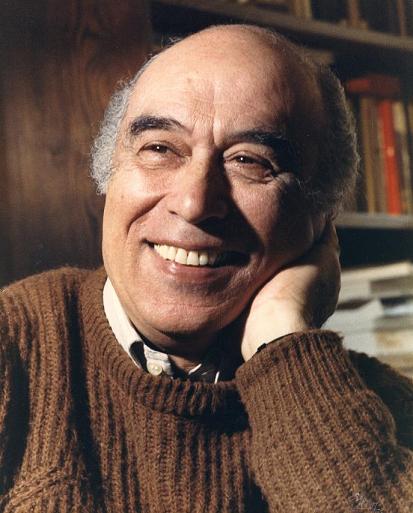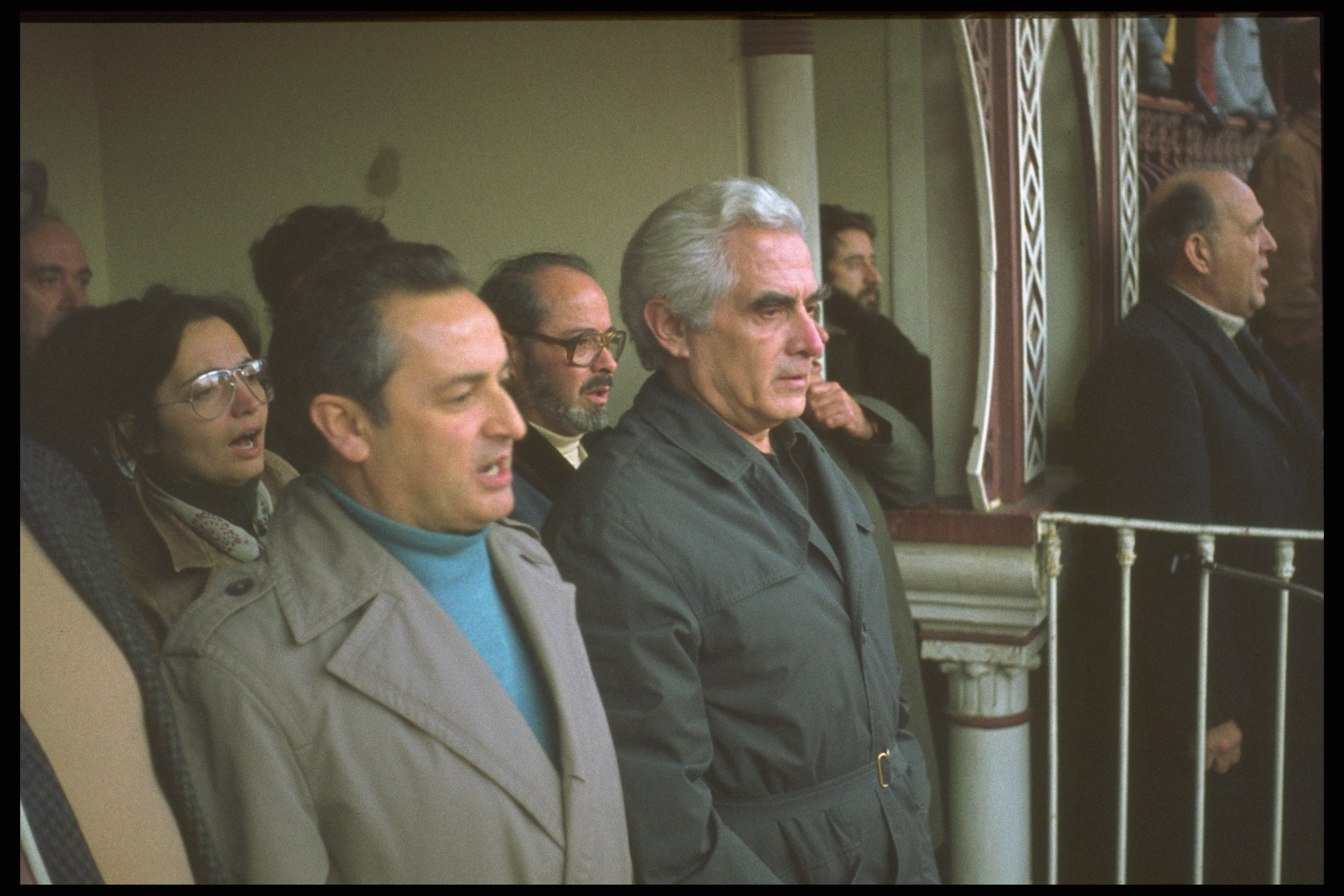|
Soeiro Pereira Gomes
Joaquim Soeiro Pereira Gomes (14 April 1909 – 5 December 1949) was a Portuguese writer of realist influence and became one of the major names of Portuguese literature of the 20th century. Pereira Gomes is, along with Alves Redol, the biggest name of the Portuguese neo-realist movement. He was also a communist militant and that was always present in his work. The Portuguese Communist Party headquarters (Soeiro Pereira Gomes Building), in Lisbon, is named after him. Life Soeiro was born in Gestaçô, Baião, Porto District, the son of two farmers. He studied in the Agricultural School in Coimbra. After finishing his studies, he emigrated to Portuguese Angola, where he worked for one year before returning to Portugal. He then settled in Alhandra, working in the local cement plant, where he developed an intense campaign of cultural dynamization among the workers. But what really made him remarkable was his work as a writer and his influence upon Portuguese society socialis ... [...More Info...] [...Related Items...] OR: [Wikipedia] [Google] [Baidu] |
Baião, Portugal
Baião () is a municipality in Porto District in Portugal. The population in 2011 was 20,522,Instituto Nacional de Estatística in an area of 174.53 km². Baião received a charter from Manuel I on 1 September 1513. The present Mayor is Paulo Pereira, elected from the . The municipal holiday is August 24. Parishes Administratively, the municipality is divided into 14 civil parishes (''''): ...[...More Info...] [...Related Items...] OR: [Wikipedia] [Google] [Baidu] |
Portuguese Angola
Portuguese Angola refers to Angola during the historic period when it was a territory under Portuguese rule in southwestern Africa. In the same context, it was known until 1951 as Portuguese West Africa (officially the State of West Africa). Initially ruling along the coast and engaging in military conflicts with the Kingdom of Kongo, in the 18th century Portugal gradually managed to colonise the interior Highlands. However, full control of the entire territory was not achieved until the beginning of the 20th century, when agreements with other European powers during the Scramble for Africa fixed the colony's interior borders. On 11 June 1951, the status was upgraded to Overseas Province of Angola and finally in 1973, State of Angola. In 1975, Portuguese Angola became the independent People's Republic of Angola. History The history of Portuguese presence on the territory of contemporary Angola lasted from the arrival of the explorer Diogo Cão in 1484 until the decolonizatio ... [...More Info...] [...Related Items...] OR: [Wikipedia] [Google] [Baidu] |
Portuguese Male Writers
Portuguese may refer to: * anything of, from, or related to the country and nation of Portugal ** Portuguese cuisine, traditional foods ** Portuguese language, a Romance language *** Portuguese dialects, variants of the Portuguese language ** Portuguese man o' war, a dangerous marine cnidarian that resembles an 18th-century armed sailing ship ** Portuguese people, an ethnic group See also * * ''Sonnets from the Portuguese'' * "A Portuguesa", the national anthem of Portugal * Lusofonia * Lusitania * {{disambiguation Language and nationality disambiguation pages ... [...More Info...] [...Related Items...] OR: [Wikipedia] [Google] [Baidu] |
People From Baião, Portugal
A person ( : people) is a being that has certain capacities or attributes such as reason, morality, consciousness or self-consciousness, and being a part of a culturally established form of social relations such as kinship, ownership of property, or legal responsibility. The defining features of personhood and, consequently, what makes a person count as a person, differ widely among cultures and contexts. In addition to the question of personhood, of what makes a being count as a person to begin with, there are further questions about personal identity and self: both about what makes any particular person that particular person instead of another, and about what makes a person at one time the same person as they were or will be at another time despite any intervening changes. The plural form "people" is often used to refer to an entire nation or ethnic group (as in "a people"), and this was the original meaning of the word; it subsequently acquired its use as a plural form of per ... [...More Info...] [...Related Items...] OR: [Wikipedia] [Google] [Baidu] |
1949 Deaths
Events January * January 1 – A United Nations-sponsored ceasefire brings an end to the Indo-Pakistani War of 1947. The war results in a stalemate and the division of Kashmir, which still continues as of 2022. * January 2 – Luis Muñoz Marín becomes the first democratically elected Governor of Puerto Rico. * January 11 – The first "networked" television broadcasts take place, as KDKA-TV in Pittsburgh, Pennsylvania goes on the air, connecting east coast and mid-west programming in the United States. * January 16 – Şemsettin Günaltay forms the new government of Turkey. It is the 18th government, last single party government of the Republican People's Party. * January 17 – The first VW Type 1 to arrive in the United States, a 1948 model, is brought to New York by Dutch businessman Ben Pon. Unable to interest dealers or importers in the Volkswagen, Pon sells the sample car to pay his travel expenses. Only two 1949 models are sold in America tha ... [...More Info...] [...Related Items...] OR: [Wikipedia] [Google] [Baidu] |
1909 Births
Nineteen or 19 may refer to: * 19 (number), the natural number following 18 and preceding 20 * one of the years 19 BC, AD 19, 1919, 2019 Films * ''19'' (film), a 2001 Japanese film * ''Nineteen'' (film), a 1987 science fiction film Music * 19 (band), a Japanese pop music duo Albums * ''19'' (Adele album), 2008 * ''19'', a 2003 album by Alsou * ''19'', a 2006 album by Evan Yo * ''19'', a 2018 album by MHD * ''19'', one half of the double album ''63/19'' by Kool A.D. * ''Number Nineteen'', a 1971 album by American jazz pianist Mal Waldron * ''XIX'' (EP), a 2019 EP by 1the9 Songs * "19" (song), a 1985 song by British musician Paul Hardcastle. * "Nineteen", a song by Bad4Good from the 1992 album '' Refugee'' * "Nineteen", a song by Karma to Burn from the 2001 album ''Almost Heathen''. * "Nineteen" (song), a 2007 song by American singer Billy Ray Cyrus. * "Nineteen", a song by Tegan and Sara from the 2007 album '' The Con''. * "XIX" (song), a 2014 song by Slipk ... [...More Info...] [...Related Items...] OR: [Wikipedia] [Google] [Baidu] |
Manuel Da Fonseca
Manuel Lopes Fonseca, better known as Manuel da Fonseca (15 October 1911 in Santiago do Cacém – 11 March 1993), was a Portuguese writer A writer is a person who uses written words in different writing styles and techniques to communicate ideas. Writers produce different forms of literary art and creative writing such as novels, short stories, books, poetry, travelogues, p .... References 1911 births 1993 deaths Portuguese male writers 20th-century Portuguese writers People from Setúbal District 20th-century male writers {{Portugal-bio-stub ... [...More Info...] [...Related Items...] OR: [Wikipedia] [Google] [Baidu] |
Fernando Namora
Fernando Namora (15 April 1919 – 31 January 1989), with the full name Fernando Gonçalves Namora was a Portuguese writer and medical doctor. Namora was born in Condeixa-a-Nova, Coimbra District and died in Lisbon, Portugal. He received his medical degree at 1942, by the University of Coimbra. Those years as student would have influenced him as a man (and writer) as well his experience as a country doctor, in remote regions as Beira Baixa and Alentejo, till the year of 1950, when he moved to Lisbon, invited to be medical assistant at the Instituto Português de Oncologia. His early book was '' Relevos'', poetry, in (1937), published at the age of 18. In (1938) appeared his first romance '' As Sete Partidas do Mundo'' that won the Almeida Garrett Prize, and, three years later, with some other colleagues at Coimbra, was involved in the literary project of '' Novo Cancioneiro'', (1941), with 10 volumes, which the first one was his poem named ''Terra'' - for many specialists th ... [...More Info...] [...Related Items...] OR: [Wikipedia] [Google] [Baidu] |
Álvaro Cunhal
Álvaro Barreirinhas Cunhal (; 10 November 1913 – 13 June 2005) was a Portuguese communist revolutionary and politician. He was one of the major opponents of the dictatorial regime of the '' Estado Novo''. He served as secretary-general of the Portuguese Communist Party (PCP) from 1961 to 1992. He was one of the most pro-Soviet of all Western Europe communist leaders, often supporting the Soviet Union's foreign policies, including the Soviet invasion of Czechoslovakia in 1968. During the 1970s, Cunhal supported Soviet leader Leonid Brezhnev’s political agenda, and strongly opposed Mikhail Gorbachev’s ''perestroika'' policies in the 1980s. Life Cunhal was born in Coimbra, the third child of Avelino Henriques da Costa Cunhal (Seia, Seia, 28 October 1887 – Coimbra, Sé Nova, 19 December 1966) and wife (m. Coimbra, Sé Nova, 22 August 1908) Mercedes Simões Ferreira Barreirinhas (Coimbra, Sé Nova, 5 May 1888 – Lisbon, 12 September 1971). His father was a lawyer in ... [...More Info...] [...Related Items...] OR: [Wikipedia] [Google] [Baidu] |
Fascist
Fascism is a far-right, Authoritarianism, authoritarian, ultranationalism, ultra-nationalist political Political ideology, ideology and Political movement, movement,: "extreme militaristic nationalism, contempt for electoral democracy and political and cultural liberalism, a belief in natural social hierarchy and the rule of elites, and the desire to create a (German: “people’s community”), in which individual interests would be subordinated to the good of the nation" characterized by a dictatorial leader, centralized autocracy, militarism, forcible suppression of opposition, belief in a natural social hierarchy, subordination of Individualism, individual interests for the perceived good of the nation and race, and strong regimentation of society and the economy. Fascism rose to prominence in early 20th-century Europe. The first fascist movements Italian Fascism, emerged in Italy during World War I, before Fascism in Europe, spreading to other European countries, most n ... [...More Info...] [...Related Items...] OR: [Wikipedia] [Google] [Baidu] |
_1938.jpg)



.jpg)